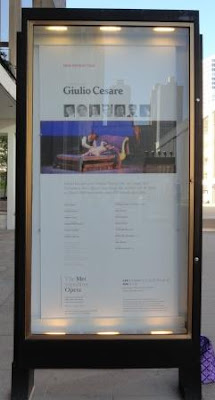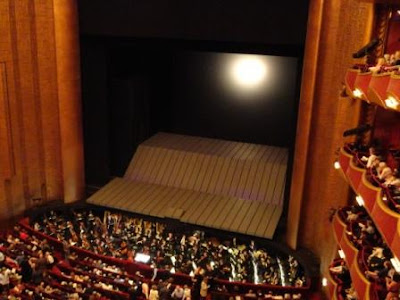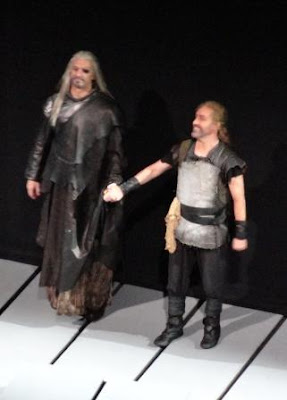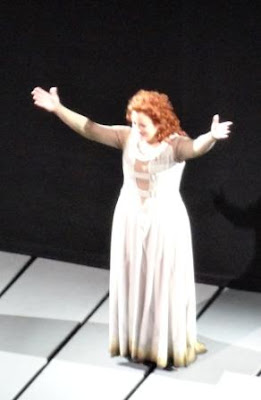(in english below)
Giulio Cesare é
uma ópera de G. F. Haendel com
libreto de Nicola Francesco Haym.
Esta produção da Metropolitan Opera foi vista numa transmissão directa MetLive
e comentada neste blogue aqui, pelo camo_opera que foi o único de nós que viu a
transmissão. O seu texto refere o enquadramento histórico e muitas outras
informações interessantes.
Eu tive o privilégio de ver, ao vivo, duas récitas.
Romanos:
O contratenor norte americano David Daniels foi Giulio Cesare. Já o ouvi ao vivo várias vezes e,
mais uma vez, gostei. Tem uma voz bem audível, de timbre agradável e bem
colocada. Esteve bem cenicamente, a interpretação é exigente mas, dada a
concorrência, não sobressaiu.
Cleópatra foi interpretada pelo soprano francês Natalie Dessay. Foi assombrosa. Já há
muito tempo que não assistia a uma interpretação de Dessay com esta qualidade.
É uma actriz que canta e fá-lo como poucas outras cantoras. Tem uma figura
excelente, as suas qualidades dramáticas são insuperáveis e a voz esteve ao seu
mais alto nível, sem denotar qualquer sinal de desgaste que já lhe ouvi em
outras interpretações. E a exigência cénica do papel não é para uma qualquer. Uma
grande Senhora da ópera!
*****
GIULIO CESARE Metropolitan Opera, New York, May 2013
Giulio Cesare is an opera by G. F. Handel with libretto by Nicola Francesco Haym. This production of the Metropolitan Opera was seen in a direct MetLive transmission and was commented on this blog, by camo_opera. In his text you can find the historical background and many other interesting information.
Giulio Cesare is an opera by G. F. Handel with libretto by Nicola Francesco Haym. This production of the Metropolitan Opera was seen in a direct MetLive transmission and was commented on this blog, by camo_opera. In his text you can find the historical background and many other interesting information.
I had the
privilege to see, live, two performances.
The staging by David McVicar is very showy, varied, colorful and full of action. Not even the singers are spared. They sing in various positions and the movement on stage is very demanding and, in the case of Tolomeo, acrobatic. The action passes through different historical periods. In the back of the stage there are 4 cylinders that rotate continuously simulating the motion of the sea, an effect used in the past but with great visual impact. There navigate, along the performance, ships from various historical eras, another very interesting option of great aesthetic beauty.
The staging by David McVicar is very showy, varied, colorful and full of action. Not even the singers are spared. They sing in various positions and the movement on stage is very demanding and, in the case of Tolomeo, acrobatic. The action passes through different historical periods. In the back of the stage there are 4 cylinders that rotate continuously simulating the motion of the sea, an effect used in the past but with great visual impact. There navigate, along the performance, ships from various historical eras, another very interesting option of great aesthetic beauty.
But even
more important that the staging was the music. The Baroque Orchestra was
directed by British conductor and harpsichordist Harry Bicket. On
stage, in the 2nd act, the excellent violin solo was played by David Chan. All musical performance was
excellent. And the soloists could not have been better:
Romans:
North American countertenor David Daniels was Giulio Cesare. I've heard him live several times, and once again I enjoyed. His voice has a broad, pleasant timbre and is well projected. The singer was well on stage, the performance is demanding, but given the competition, he did not excelled.
Romans:
North American countertenor David Daniels was Giulio Cesare. I've heard him live several times, and once again I enjoyed. His voice has a broad, pleasant timbre and is well projected. The singer was well on stage, the performance is demanding, but given the competition, he did not excelled.
Cornelia,
widow of Pompey, was interpreted by Irish mezzo Patricia Brandon. Her voice is very audible, expressive and always
in tune, and the singer had a very convincing performance.
English mezzo Alice Coote was Sesto Pompeo, son of Cornelia. She was one of the best performers of the night. Coote has an amazing voice with an unusual quality in all its extension. She was unsurpassed. I've seen her several times, almost always doing male roles that fit her very well, given her physical and vocal characteristics.
English mezzo Alice Coote was Sesto Pompeo, son of Cornelia. She was one of the best performers of the night. Coote has an amazing voice with an unusual quality in all its extension. She was unsurpassed. I've seen her several times, almost always doing male roles that fit her very well, given her physical and vocal characteristics.
Egyptians:
Cleopatra was interpreted by French soprano Natalie Dessay. She was astonishing. It was one of the best interpretations of Dessay I have attended. She is a singing actress and she performs like few other singers. She has an excellent figure, her dramatic qualities are unsurpassed and her voice was at its highest level without any sign of fatigue that I have heard in other interpretations. And the staging demand of the role is remarkable. A great Lady of the opera!
Cleopatra was interpreted by French soprano Natalie Dessay. She was astonishing. It was one of the best interpretations of Dessay I have attended. She is a singing actress and she performs like few other singers. She has an excellent figure, her dramatic qualities are unsurpassed and her voice was at its highest level without any sign of fatigue that I have heard in other interpretations. And the staging demand of the role is remarkable. A great Lady of the opera!
French
countertenor Christophe Dumaux was
his brother Tolomeo, king of Egypt
The third
countertenor was Moroccan Rachid Ben
Abdeslam who played Cleopatra's confidant Nirenus. He was another good
performer, artistic and vocal, though the role is relatively small.
Finally, Italian baritone Guido Loconsolo was an Achilla at the same level of the other soloists. The voice has a pleasant timbre and the singer was firm. He also has a very suitable figure for the character, something that was constant in all the soloists.
A luxury Giulio Cesare that, contrary to what I had planned, I saw twice in the week I was inNew York
Finally, Italian baritone Guido Loconsolo was an Achilla at the same level of the other soloists. The voice has a pleasant timbre and the singer was firm. He also has a very suitable figure for the character, something that was constant in all the soloists.
A luxury Giulio Cesare that, contrary to what I had planned, I saw twice in the week I was in
In a few
days I will post some pictures of the second performance.
*****
*****




























































